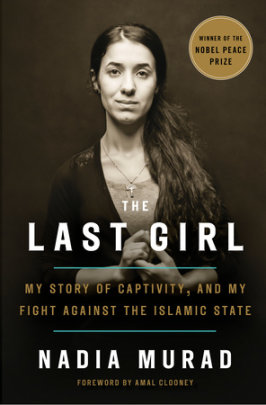
The Last Girl: My Story of Captivity, And my Fight Against the Islamic State by Nadia Murad
Western readers don't really know and many don't care to know what goes on inside those who claim the name of the Islamic State. In this gripping account of captivity, fighting, and release, Nadia Murad recounts her story as a member of the Yazidi's and her plight that ran toe to toe with these militants. Rather than rehash the historical record of the uprising of the Islamic State, Nadia tells her story of living in Iraq, growing up in a large family, and seeking to toil for a living in the dry and hot climate of Kocho in northern Iraq.
What was striking to me was the way Nadia described her people, the Yazidis. Nadia tells the story by stating, "Yazidis believe that before God made man, he created seven divine beings, often called angels, who were manifestations of himself. After forming the universe from the pieces of a broken pearl-like sphere, God sent his chief Angel, Tawusi Melek, to earth, where he took the form of a peacock and pained the world the bright colors of his feathers." (27) Tawusi goes onto meet Adam and challenge him in his immortality. "If Adam is to reproduce, he can't be immortal, and he can't be perfect. He has to eat wheat, which God has forbidden him to do. God puts the decision in Tawusi's hands. Adam eats wheat, is expelled from paradise, and the second generation of Yazidis are born into the world." Tawusi is God's link to earth and man's link to the heavens. Many people hate the Yazidis because they see in Tawusi God's chief Angel and he betrayed Adam, therefore, they see him as a deceiver much in the vein of Satan.
Much of Nadia's story is about her time being taken by the Islamic state militants, being transported, spat on, touched inappropriately, and being harassed. The anger I felt when reading this account was palpable and it was frustrating. She writes, "Everyone on the bus was destined for that fate. We were no longer human beings - we were sabaya." This word roughly translated "sexual slaves" was the goal of these militants, to have these women to do whatever they wanted with them. The constant refrain was a dagger in her heart, "I will punish you if you try to escape," but he never said exactly what he would do...Salman hit me all the time." (171) After fleeing and running down alleys and roads, Nadia was on her way to Kurdistan to find safety. She writes at the end of the book, "The genocide changed everyone. Hezni dedicated his life to assisting smugglers in freeing sabaya."
The speaking and engaging minority issues that Nadia so fiercely works on now reflect her tenacious spirit to not let injustice go unpunished. This is a hard book to read but one that really sheds light on the Islamic State and their heinous practices.
Thanks to Blogging for Books for the copy of this book in exchange for an honest review.
Comments
Post a Comment